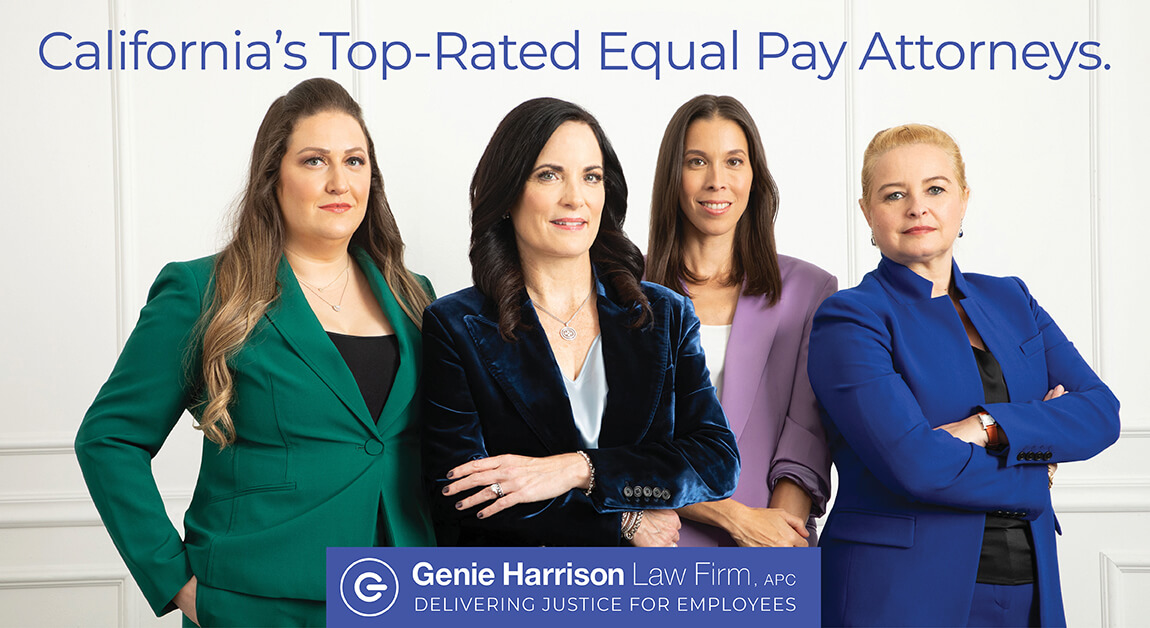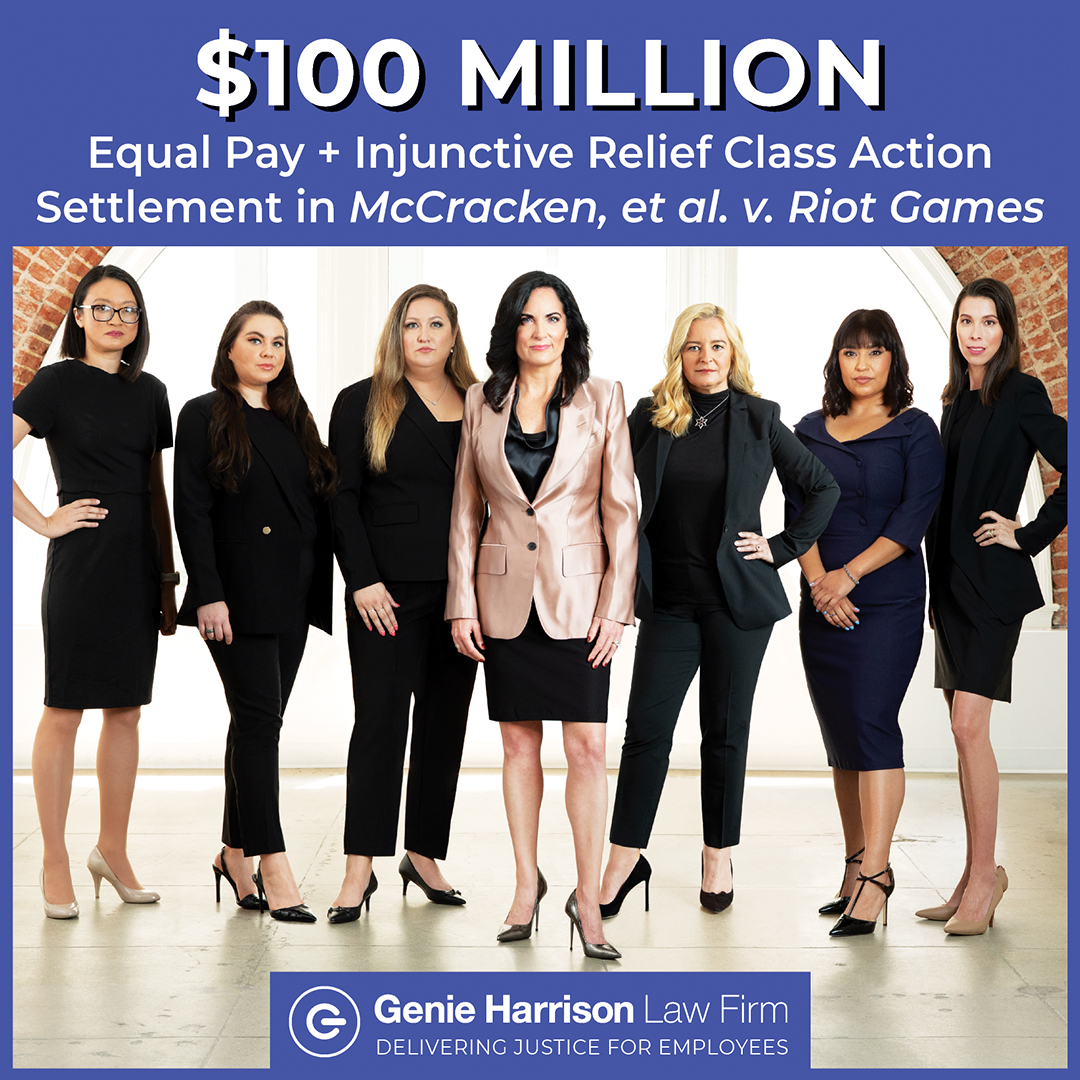
Fight Gender-Based Discrimination and Get Equal Pay: Choose the Top Equal Pay Law Firm in California
Looking for an experienced law firm to advocate for you in cases of gender-based discrimination? Look no further than the Genie Harrison Law Firm. Our team has a proven track record of success in securing justice for thousands of women who have faced unequal pay for equal work in California.
Proven Results: How We Deliver Success
Genie Harrison, our lead counsel, is currently representing the women of Riot Games in their landmark equal pay class action, which resulted in a $100 million settlement and major workplace reforms. In this case, our firm substituted into the litigation when the class became dissatisfied with a $10 million settlement proposal. Working alongside co-counsel and state labor authorities, Ms. Harrison negotiated the largest pre-trial equal pay class action settlement in history.
Don’t let gender-based discrimination go unchecked – contact the Genie Harrison Law Firm today to learn more about how we can help you with your equal pay or gender discrimination case.
What is the Equal Pay Act?
The Federal Equal Pay Act of 1963
The 19th Amendment gave women the right to vote, but women’s entry into the workforce was an even greater catalyst for gender equality.
As wage-earners, women gained independence, influence, and legal protections. And as a result, legislation supporting women in the workplace was passed, including the Federal Equal Pay Act of 1963, and California’s Equal Pay Act of 1949.
Despite these laws, the gender wage gap persists, with women earning 80 cents for every dollar earned by male colleagues in 2017. The gap is even wider for women of color, with Black women not expected to achieve wage equality until 2119 and Hispanic women not until 2224.
— Institute for Women’s Policy Research, “Pay Equity & Discrimination.”
The California Equal Pay Act of 2015
To close the wage gap and extend the CA EPA, California enacted the California Fair Pay Act in 2015 and has amended it annually to further protect working women. Despite these changes, the EPA and the CA EPA remain aligned in many significant areas. Jones v. Tracy School Dist. (1980) 27 Cal.3d 99, 111.
The EPA and the CA EPA were political victories for gender equality and endeavored to further empower women by providing them with pay equal to their male counterparts. The EPA’s fundamental principle is that “equal work will be rewarded by equal wages.” S.Rep. No. 176, 88th Cong., 1st Sess., 1 (1963). To achieve this, the EPA bars employers from discriminating against employees on the basis of sex by paying different wages for equal work that requires equal skill, effort, and responsibility, and is performed under similar working conditions. 29 U.S.C. §206(d)(1).
What is equal work?
Equal Work
Equal work is defined by the U.S. Equal Employment Opportunity Commission (EEOC) as work that is substantially equal, rather than identical. This means that employers cannot use job titles or classifications to justify pay differences. Instead, pay should be based on the actual job requirements and performance. Determining equal work is a case-by-case process, according to the EEOC. (29 C.F.R. §1620.11, §1620.13(e)).
What Is Equal Effort, Skill, and Responsibility?
Equal Effort, Skill, and Responsibility Under EPA Regulations
The Equal Pay Act (EPA) requires employers to provide equal pay to employees who perform substantially similar work, regardless of gender. To determine whether two jobs are substantially similar, the EPA considers the effort, skill, and responsibility required for each job.
Equal Skill
The EPA requires equal skill based on experience, training, education, and ability (29 C.F.R. §1620.15). Even if one job requires a skill more frequently than another, jobs requiring the same skills meet the requirement (29 C.F.R. §1620.15(a)). “Equal skill” is determined by what the job requires, not by the skill possessed by one of the employees (Hein v. Oregon College of Ed. (9th Cir. 1983) 718 F.2d. 910, 914).
Equal Effort
Equal effort is determined by the total physical or mental exertion needed for the job (29 C.F.R. §1620.16(a)). Different kinds of effort do not mean jobs require unequal effort (29 C.F.R. §1620(b)). For example, a male grocery store checker may be required to expend more physical effort, while a female checker may be required to perform work requiring more dexterity. However, this does not make their effort unequal (29 C.F.R. §1620(b)).
Equal Responsibility
Equal responsibility means the degree of accountability required in performing a job (29 C.F.R. §1620.17(a)). While a temporary supervisory role may justify a higher wage rate (29 C.F.R. §1620.17(b)), minor differences in responsibility will not justify differential wage rates (29 C.F.R. §1620.17(b)).
Overall, these regulations aim to ensure that employees receive equal pay for equal work, regardless of their gender.
Intentional Discrimination
Do I Need to Prove Intentional Discrimination?
No, under the Equal Pay Act, an employee is not required to prove that their employer intended to discriminate against them based on sex. Instead, the employee must only show that they were paid less for similar work.
Ledbetter v. Goodyear Tire & Rubber Co., Inc.
In the Ledbetter v. Goodyear Tire & Rubber Co., Inc. case, the Supreme Court ruled that an employee can bring a claim for pay discrimination without having to prove that the employer intended to discriminate. However, the decision was overturned on other grounds by legislative action on Jan. 29, 2009.
What are similar working conditions?
A determination of similar working conditions requires the examination of two subfactors: surroundings and hazards. Surroundings measure the elements (like toxic chemicals) regularly encountered by a worker, their intensity, and their frequency. Hazards examine physical hazards regularly encountered, their frequency, and the severity of injury they can cause. 29 C.F.R. §1620.18(a).
Difference in shifts, such as night versus day shifts, and minor differences in the surroundings and hazards of certain positions will not constitute different working conditions under the EPA. 29 C.F.R. §1620.18(b).
When can an employer pay different wages for the same work?
Employers are justified in paying different wages for similar work when the wage differential is due to:
(1) a seniority system;
(2) a merit system;
(3) a system that measures earnings by quantity or quality of production; or
(4) some other differential based on a factor other than sex that was adopted for a neutral legitimate reason. 29 U.S.C. §206(d)(1). Stanley v. University of Southern California (9th Cir. 1999) 178 F.3d 1069, 1075.
In California, the CA EPA includes the first three defenses but limits the fourth defense to “a bona fide factor other than sex, such as education, training, or experience.” Cal. Lab. C. §1197.5(a)(1). To rely on the fourth defense under the CA EPA, employers must demonstrate that it is not based on a sex-based compensation difference, is job-related, and is essential to the business. Cal. Lab. C. §1197.5(a)(1)(D). Additionally, an employee can disprove this defense by demonstrating an alternative business practice that achieves the same goal without a wage differential. Cal. Lab. C. §1197.5(a)(1)(D).
Can I ask co-workers about their wages to determine if there is a wage gap?
In California, you can. An employer cannot retaliate against an employee for enforcing their rights under the CA EPA, and it cannot prohibit an employee from disclosing their own wages, discussing the wages of others, inquiring about another employee’s wages, or aiding or encouraging any other employee to exercise their rights under the CA EPA. Cal. Lab. C. §1197.5(k)(1).
Contact the Women’s Rights Attorneys at the Genie Harrison Law Firm,
Fierce Advocates For Equal Pay For Women:
For a completely confidential consultation with an experienced labor and employment attorney, please contact us at (213) 805-5301 or use the email form below to provide us with a brief description of your case:
GENIE HARRISON LAW FIRM, APC LOCATIONS
Los Angeles: 523 W. 6th Street, Suite 707, Los Angeles, CA 90014
Calabasas: 23975 Park Sorrento, Suite 202, Calabasas, CA 91302


